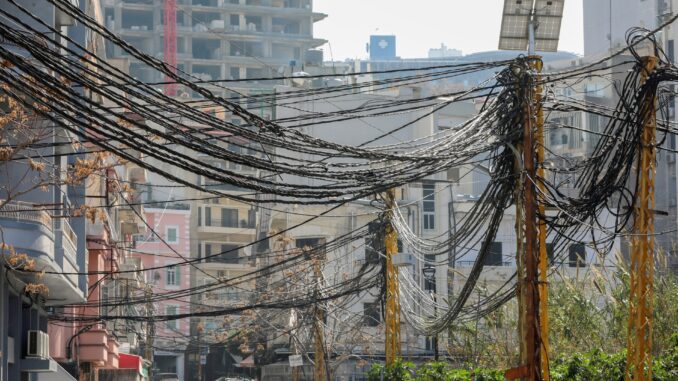
Lebanese authorities have failed to uphold the right to electricity by mismanaging the sector for decades, Human Rights Watch has said in a newly released report.
The US-based watchdog on Thursday said that electricity must be regarded as an internationally protected right necessary for an adequate standard of living.
“Lebanon’s electricity crisis is leaving people in the dark and dramatically reducing people’s access to critical rights such as food, water, education, and health care,” said Lama Fakih, Middle East and North Africa director at Human Rights Watch.
“The dire situation in Lebanon illustrates why access to safe, clean, and affordable electricity isn’t merely an amenity, but is a human right that the state has an obligation to fulfill.”
In a survey of more than 1,200 households, HRW and the Consultation and Research Institute (CRI), a local research firm, found the electricity crisis to have pushed people into poverty and diminished their access to necessities including food, water, and health, which, in turn, exacerbated inequality.
At present, the government provides electricity for one to three hours a day on average. Residents who can afford it supplement the government supply by paying for access to private generators.
Nine out of every 10 households surveyed said the cost of electricity affected their ability to pay for other essential services.
Additionally, generators run on fuel, causing extensive air pollution that “affects the environment, and health and contributes to a worsening climate crisis”.
Human Rights Watch pointed to three decades of mismanagement of the electricity sector by Lebanese authorities as the main cause of the current state of affairs.
Instead of appointing members to an independent Electricity Regulatory Authority to direct the sector, as mandated by law, the Council of Ministers exerted almost complete control over the sector with little transparency and accountability.
“Politicians and politically connected individuals have used the electricity sector to further their political goals, including by doling out jobs at the government-run company to make huge profits from lucrative contracts, often at the state’s expense, and reap profits from the private generator market,” the report said.
Lebanon’s economy has been mired in a deep financial crisis since October 2019. In March 2020, the crisis culminated in the country’s first sovereign default.
While electricity blackouts have been a persistent problem for decades, they became a full-blown crisis in the summer of 2021, when the Lebanese state failed to secure the foreign currency necessary to buy fuel.
The rapid devaluation of the Lebanese lira – which lost more than 95 percent of its pre-crisis value – as well as supply-chain bottlenecks and fuel shortages have caused prices for electricity, water, and gas to increase by 595 percent, the report said.
In addition, an explosion at the Beirut port on August 4, 2020, that left more than 200 dead, 6,000 injured, and 300,000 people homeless caused extensive damage to infrastructure, including transport, energy, water supply and sanitation.
The United Nations estimated that more than two-thirds of Lebanon’s population now live in poverty.
“Lebanon needs to take immediate action to bolster the electricity sector and reverse the ongoing erosion of basic economic rights,” Fakih said.
“The government should invest in renewable energy sources that will create job opportunities, lessen pollution, and give people in Lebanon access to reliable, safe, and clean electricity.”
Human Rights Watch says Lebanon’s electricity crisis has exacerbated poverty and inequality.



